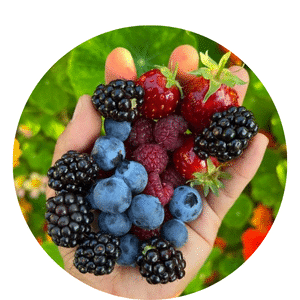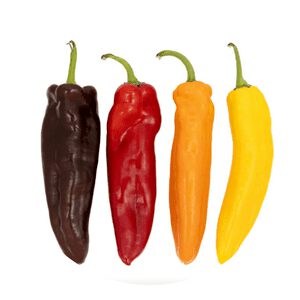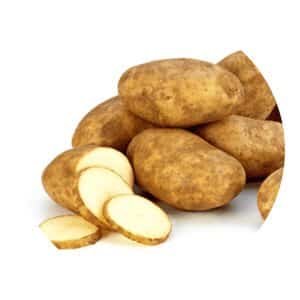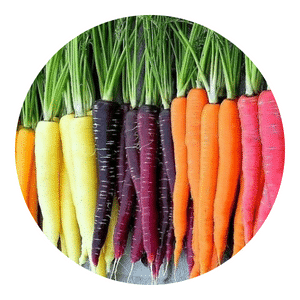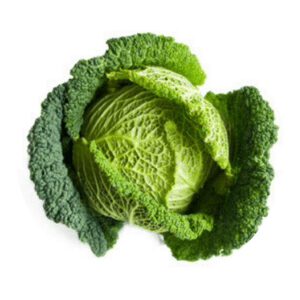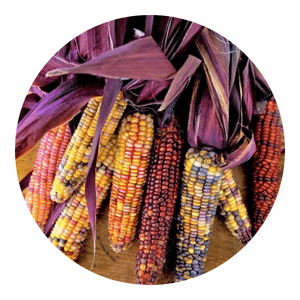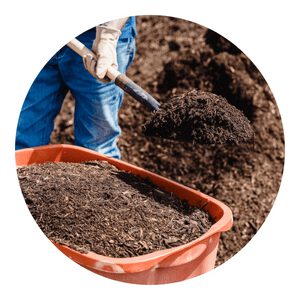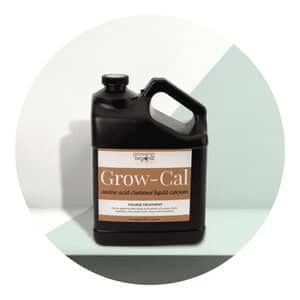What Fruits and Vegetables Grow in Michigan
Michigan is home to some of the most diverse and delicious fruits and vegetables in the world.
From sweet apples and cherries to hearty squash and potatoes, this state has a plethora of produce to offer its residents and visitors alike.
Knowing what grows in Michigan can help you make informed decisions about which foods to add to your diet for maximum nutrition, flavor, and variety.
In this article, we will take a look at just some of the delicious fruits and vegetables that thrive in this great state.

Michigan Menu
Michigan's Fruits and Veggies
Michigan is a diverse state with many different types of fruits and vegetables that can be grown in the area.
With its temperate climate, Michigan offers a variety of seasonal produce that can be enjoyed all year round.
From apples to asparagus, Michigan has something for everyone when it comes to local produce.
The state’s warm summers allow for many different types of fruits and vegetables to thrive, including cherries, peaches, blueberries, raspberries, corn and tomatoes.
In the springtime season you’ll find asparagus growing throughout the state along with potatoes and other root vegetables like turnips and carrots.
The fall brings tasty squash varieties such as pumpkins and butternut squash as well as apples from the many orchards across Michigan.
Fruits Grown in Michigan
Michigan is home to a wide variety of fruits and vegetables, making it a great destination for farmers and shoppers alike.
Homegrown fruits are one of the most popular items grown in the state, with some of Michigan’s top crops including apples, cherries, blueberries, strawberries and grapes.
These delicious fruits are available year-round at local farmer’s markets or grocery stores.
In addition to these favorites, Michigan also produces an impressive selection of stone fruits such as peaches, plums and nectarines.
These tasty treats add flavor and sweetness to any meal.
For those looking for a unique experience when shopping for produce in Michigan, several specialty varieties can be found throughout the year such as melons (cantaloupe & honeydew), cranberries and pears.
Apples
Apples are among the most popular fruits grown in Michigan.
Every autumn, thousands of people come to the state to pick apples fresh from the trees. This gives Michigan residents easy access to fresh, locally-grown fruit all year long.
Apples are not only a favorite for picking, but they also provide Michigan farmers with an important agricultural crop that can bring them great financial benefits.
Michigan’s apple industry has been around for centuries and is closely linked with the state’s cultural heritage and identity.
The temperate climate and soil composition of Michigan make it ideal for growing apples, giving farmers an ample supply of varieties including Honeycrisp, Golden Delicious, Red Delicious, Granny Smiths, Gala and more.
Cherries
Michigan is known for more than its auto industry and beautiful beaches.
The state is also home to several delicious fruits and vegetables, including cherries.
This super food is enjoyed year-round in pies, jams, juices, and even salads.
For those looking to get their hands on the freshest cherries around, Michigan offers an abundance of options due to its favorable climate.
The peak cherry season runs from late June through early August and commonly overlaps with other local fruits such as blueberries and strawberries.
During this time many farmers open their orchards for visitors who are looking to pick their own cherries off the tree.
In addition to providing a fun outdoor experience for families, it also allows them access to some of the best tasting fruit around!
Apples, cherries, and the famous blueberry pie Raspberries and peaches so sweetly shy Cucumbers, tomatoes that ripen in the sun Asparagus, lettuces for every one Pumpkins, green beans both a Michigan specialty Eggplant, potatoes our garden bounty fee As onions sparkle from autumn to spring Michigan fruits and vegetables make all mouths sing!
Chappy The Gardener
Peaches
Peaches are a popular summer fruit that can be found growing in Michigan. Peach season typically starts in mid-July and extends into early September.
Peaches are one of the most popular fruits grown in Michigan due to the large variety of sweet and juicy varieties that come from this region.
From white to yellow peaches, they offer a unique flavor and texture that is hard to find anywhere else!
Michigan growers take pride in their peach production, often using traditional varieties such as Elberta or Redhaven even though modern hybrids have been developed over the years.
With a variety of harvesting techniques, including hand-picking and machine harvesting, they are able to produce high quality peaches for local grocers or roadside stands throughout the state.
In addition to being enjoyed fresh, peaches can also be used for baking pies or cobblers and making jams or preserves.
Plums
Plums are a popular fruit grown throughout Michigan.
Native to the region, these delicious fruits have been cultivated in Michigan since settlers first arrived in the state.
Plums ripen in late summer and early fall, bringing a wealth of flavor and nutrition to Michiganders.
The tartness of plums make them an ideal ingredient for pies, jams or sauces; while sweeter varieties can be eaten raw or used as topping for cakes and other desserts.
Plums can also be dried or frozen for future use throughout the winter months.
Not only are they delicious but they are rich in nutrients like potassium, calcium, magnesium and vitamins A & C that support healthy bones, skin and immune system health.
Grapes
Grapes are one of the most popular fruits and vegetables that can be found growing in Michigan.
From warm summer days spent picking grapes from a vine, to creating delicious jams and jellies from their sweet juiciness, this fruit is sure to add a burst of flavor to any meal.
There are two distinct types of grapes grown in Michigan: wine grapes and table grapes.
Wine grapes tend to grow in warmer climates and are used for making Michigan’s award-winning wines.
Table grapes grow best in cooler areas with long growing seasons; these varieties are often eaten fresh or dried as raisins.
With multiple grape-producing regions throughout the state, you can be sure to find an abundance of healthy, locally sourced options at farmers markets or grocery stores near you!
Blueberries
Native to the region, blueberries have become an iconic part of Michigan’s agricultural landscape.
These sweet, juicy berries are chock full of healthy vitamins and antioxidants that make them essential for any well-rounded diet.
Michigan is one of the top blueberry-producing states in the nation, thanks in large part to its ideal growing conditions and abundance of local growers harvesting their crops throughout late June through mid-August each year.
Blueberries thrive in slightly acidic soil with plenty of organic matter, making them easy to plant in home gardens as well as larger commercial farms across the state.
Gardeners can enjoy picking their own fresh fruit straight from bushes or purchase pre-picked berries from local farmers markets or grocery stores nearby.
elit tellus, luctus nec ullamcorper mattis, pulvinar dapibus leo.
Vegetables Grown in Michigan
Michigan is known for its abundance of diverse agricultural products, and vegetables play a large part in the state’s produce industry.
Michigan has an ideal climate for growing many types of vegetables; from cool weather crops like asparagus to warm season favorites like tomatoes, Michigan farmers are able to cultivate a wide range of tasty vegetables.
The Great Lakes region provides plenty of fresh water resources that allow farmers to irrigate their crops and ensure optimum growth.
The sandy soil found throughout much of the state also helps vegetable plants take root quickly and efficiently.
Some popular vegetables grown in Michigan include potatoes, snap beans, carrots, cabbage, onions, peppers and corn. In addition to these staples there are many heirloom varieties that grow well in Michigan’s moderate temperatures.
Tomatoes
Tomatoes are one of the most popular and versatile vegetables found in the state.
Whether you’re looking for slicing tomatoes, cherry tomatoes, or heirloom varieties, Michigan farmers have it all!
Tomatoes are an excellent source of vitamin C and A as well as fiber and potassium.
They can be eaten raw or cooked; diced up in salads or sauces; added to sandwiches or tacos; grilled into kabobs; roasted with herbs—the possibilities are endless! Plus they make a tasty addition to your garden if you have space to grow them yourself.
Michigan is proud to offer some of the best tomato varieties available on the market.
Peppers
Michigan is home to a variety of fruits and vegetables.
Peppers are one of the most popular produce grown in Michigan, as they thrive in the state’s climate.
Peppers come in many colors and sizes, including red, green, yellow and even purple! Plus, there are a variety of pepper varieties available from sweet bell peppers to spicy habanero peppers.
Pepper plants can be planted in the spring or late summer months for best results. Additionally, soil with good drainage and exposure to direct sunlight will help create an ideal growing environment for peppers.
When harvesting your peppers it is important to pick them when they are fully matured (which usually takes about 70-90 days).
Picking early may reduce spice level while picking too late can cause the pepper to split open on its own before being picked.
Potatoes
Michigan is home to some of the most delicious fruits and vegetables, and potatoes are no exception.
This popular root vegetable has been a staple in Michigan kitchens for generations.
Potatoes are an incredibly versatile crop that can be used in a variety of dishes, from mashed potatoes to roasting them with garlic and rosemary.
Not only do they make for delicious meals but they’re also filled with essential vitamins and minerals like potassium and vitamin C.
Potatoes have a long history in Michigan dating back to the early 19th century when they were first introduced as a commercial crop.
Since then, farmers have taken great pride in their potato farms which are now known for producing some of the highest quality potatoes in the nation.
From russet potatoes to sweet ones, there is something for everyone grown right here in Michigan!
Carrots
Michigan is home to a wide variety of fruits and vegetables, but few are as iconic and beloved as the humble carrot.
With its vibrant orange hue and sweet, crunchy taste, this root vegetable has become one of Michigan’s most popular produce items.
Carrots have been cultivated in the state since settlers first arrived in the early 1800s and are grown on more than 20 different farms across Michigan today.
The sunny days and cooler nights of Michigan’s growing season make it an ideal place for producing carrots, which thrive in soil with plenty of organic matter.
The state also offers farmers access to fresh water sources that provide essential moisture for growing large, flavorful carrots.
Additionally, the sandy terrain found throughout Michigan is great for cultivating healthy carrot crops without damaging their delicate roots during harvest time.
Cabbage
Cabbage is a vegetable that can be grown in many parts of the United States, including Michigan.
This leafy green vegetable is an excellent source of antioxidants and vitamins that are essential for healthy living.
Cabbage is high in fiber and low in calories, making it a perfect addition to any diet plan.
In Michigan, cabbage is easy to grow both indoors and outdoors.
The optimal temperature for growing cabbage should range from 65-75°F with plenty of sunshine throughout the day.
To ensure optimal growth, the soil should be kept moist but not overly saturated with water.
A organic fertilizer will help promote healthy growth as well as keeping pests at bay throughout the season.
Corn
Michigan is home to many different fruits and vegetables, but one of the most popular crops is corn.
Corn is a staple part of Michigan’s agricultural industry, with over 3 million acres planted yearly for harvest.
The state has a long history of growing corn, with farmers using traditional methods as well as more modern techniques to cultivate the crop each year.
The climate in Michigan makes it ideal for growing corn because it provides warm summer temperatures that help the corn mature quickly and produce high yields.
Additionally, local farmers have access to advanced technologies such as genetic modification and hybridization that helps improve the quality of their crops.
This allows them to produce higher yields and better-tasting varieties than ever before.
Furthermore, there are even some organic farms in Michigan that are committed to sustainable farming practices while still producing delicious corn!
Local Produce: Taste and Nutritional Value
For those looking to get the most out of their Michigan produce, there are few better options than local fruits and vegetables.
By purchasing locally grown produce, consumers can take advantage of increased flavor and nutritional value with their food choices.
Not only does this provide a great source of nutrients for all diets, these foods also offer plenty of variety for those seeking different flavors and textures in their meals.
The availability of locally-grown fruits and vegetables in Michigan is impressive, ranging from sweet cherries to crunchy carrots.
From cold-weather staples like potatoes to summer favorites like corn on the cob, there is something for everyone when it comes to finding fresh ingredients from local farms or markets.
The best part about sourcing produce in Michigan is that it’s harvested at its peak ripeness ensuring that dishes made with local ingredients are full of flavor.
Fresher taste and higher nutritional value of locally-grown fruits and vegetables
When it comes to fresh, locally-grown fruits and vegetables, Michigan has a lot to offer.
Michigan’s diverse climate allows for a wide variety of produce that is both delicious and nutritious.
From cherries in Traverse City to apples in Alpena, there are plenty of great options for local grocery shoppers.
Michigan fruits and vegetables are known for their superior flavor and nutrition compared to those grown elsewhere in the country.
Local farmers use sustainable practices such as crop rotation and mulching which helps them produce high-quality produce with fewer chemicals or preservatives.
This means less pesticides on your plate and more nutrients like vitamins, minerals, antioxidants, fiber and phytochemicals in your diet!
Furthermore, these fruits and veggies contain higher levels of freshness due to the short distance from farm to table – perfect for making all your favorite dishes taste even better!
Support of local agriculture and economy
Michigan is a state known for its abundance of fresh produce, from cherries to blueberries, apples and asparagus.
Supporting local agriculture not only provides access to the freshest foods, but also helps to contribute to Michigan’s economy.
Shopping at farmers markets or subscribing to a local CSA are just two ways that individuals can support their local Michigan farmers and get access to the best in-season fruits and vegetables.
The great thing about buying locally grown food is that it not only comes with economic benefits like increased job opportunities, but it also allows consumers access to some of the most nutrient dense produce available.
Not only do shoppers have peace of mind knowing where their food comes from, but they’ll also be able to find out exactly how it was grown and harvested.
Reduction of environmental impact of transportation
The transportation industry has an immense environmental impact, but there are several ways to reduce this.
One of the most effective methods is to switch from petrol and diesel-powered cars to those that run on electricity or other alternative fuel sources.
Electric vehicles produce fewer pollutants than their petrol and diesel counterparts, making them a much more environmentally friendly option.
Additionally, investing in public transportation systems such as buses and trains can significantly reduce the amount of private car ownership, thereby reducing emissions and improving air quality.
Another way to reduce the environmental impact of transportation is by increasing fuel efficiency standards for vehicles.
Automakers are now introducing technologies that enable cars to consume less fuel while still providing reliable performance.
These improvements have allowed us to drive further without putting extra strain on our environment.
In conclusion, Michigan provides an abundance of fruits and vegetables for its residents, regardless of the season.
From asparagus to cherries, Michigan has something for everyone.
With careful planning and preparation, Michiganders are able to enjoy fresh and delicious fruits and vegetables all year long.
Eating a variety of fresh produce is a great way to support local farms while also providing your body with essential vitamins and minerals.
Make sure to take advantage of the diverse range of produce grown in Michigan!
Click To Grow

Solar Light

Plant Pots

Bird House
Helps Us Grow – Share If You Like







